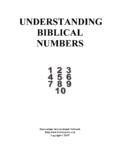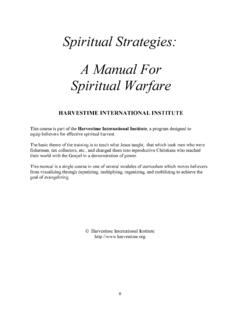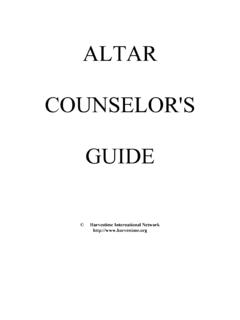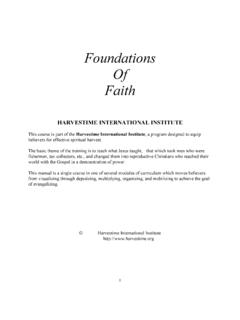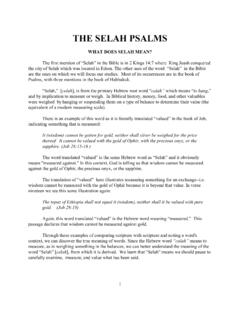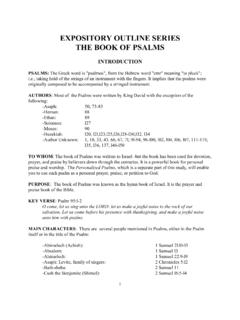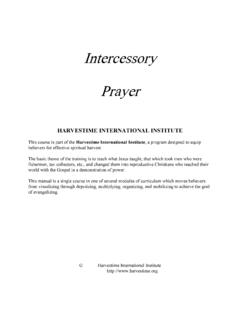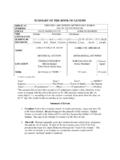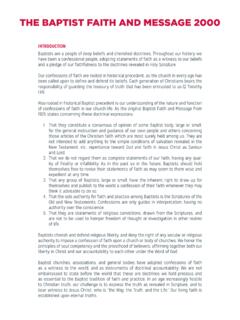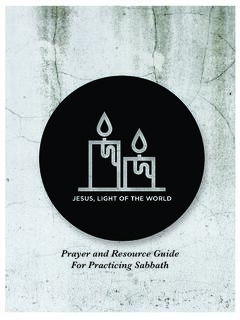Transcription of BIBLICAL THEOLOGY - Harvestime
1 BIBLICAL . THEOLOGY . "Have I not written to you excellent things of counsels and knowledge, that I may make you know the certainty of the words of truth, that you may answer words of truth to those who send to you?". (Proverbs 22:20-21). Harvestime International Network 1. TABLE OF CONTENTS. Page An Introduction To THEOLOGY 3. Chapter One: Paterology: God The Father 6. Chapter Two: Christology: Jesus Christ 27. Chapter Three: Pneumatology: Holy Spirit 59. Chapter Four: Angelology: Angels 91. Chapter Five: Demonology: Satan And Demons l05. Chapter Six: Bibliology: The Bible 121. Chapter Seven: Harmartiology: Sin 144.
2 Chapter Eight: Soteriology: Salvation 157. Chapter Nine: Ecclesiology: The Church 171. Chapter Ten: Eschatology: Prophecy, The End-times, Eternity 185. Epilogue 198. Answers To Self-Tests 199. 2. AN INTRODUCTION TO THEOLOGY . THE DEFINITION OF THEOLOGY . The word " THEOLOGY " comes from two Greek words, theos meaning "God" and logos meaning "the word about" or "the study of" God as He is revealed in the Scriptures. Simply defined, THEOLOGY is an in-depth study of the Holy Bible to discover what God has said about Himself, His purposes, His plans, and His promises. THE SUBJECTS OF THEOLOGY . The major subjects of THEOLOGY includes the study of: -Paterology: The study of God, the Father.
3 -Christology: The study of the Son, Jesus Christ. -Pneumatology: The study of the Holy Spirit. -Angelology: The study of angels. -Demonology: The study of Satan and demons. -Bibliology: The study of the Holy Bible, which is the revelation of God. -Harmartiology: The study of sin. -Soteriology: The study of salvation which is God's provision for sin. -Ecclesiology: The study of the Church. -Eschatology: The study of BIBLICAL prophecy, the end-times, and eternity. These words are not used in the Bible, but are terms used by scholars to describe the major subjects of THEOLOGY . Entire volumes have been written on each of these subjects--a book could easily be written on each topic.
4 The purpose of this study, however, is to provide a summary for independent learning and/or teaching of basic theological concepts. It uses the Scriptures as the primary resource, and does not deal with conflicting theological arguments. THE CENTRAL THEME. The Bible reveals the mystery of God's plan which is the unifying theme of the Bible. It is the revelation of Jesus Christ as the Savior of sinful mankind. Jesus explained how the Old Testament centered on Him: "And He said unto them, These are the words which I spake unto you while I was yet with you, that all things must be fulfilled, which were written in the law of Moses, and in the prophets, and in the psalms concerning me" (Luke 24:44).
5 With this introduction, Jesus continued and "..opened He their understanding that they might understand the scriptures" (Luke 24:45). What was the key Jesus gave them to understanding the Scriptures? The fact that its major theme focused on Him: "..Thus it is written, and thus it behooved Christ to suffer, and to rise from the dead the third day: And that repentance and remission of sins should be preached in His name among all nations, beginning at Jerusalem. And Ye are witnesses of these things" (Luke 24:46-48). 3. The Old and New Testaments both tell the story of Jesus. The Old Testament prepares us for His coming and the New Testament tells how it happened.
6 This unites the entire Bible and the study of BIBLICAL THEOLOGY in one major theme: Jesus Christ. THE IMPORTANCE OF THEOLOGY . There are several important reasons for studying and understanding the major teachings of Scripture. - THEOLOGY is important for personal spiritual growth and development so that you may "..grow in grace, and in the knowledge of our Lord and Saviour Jesus Christ" (2 Peter 3:18). Growth takes time in the natural world as well as the spiritual world. Some theological truths can only be understood over a period of time. For example, if you are a new believer, you may not understand the faithfulness of God as well as someone who has served the Lord for years.
7 - THEOLOGY is important in order to avoid doctrinal error. The first sin resulted from the enemy questioning "..Has God said?" ( genesis 3:1). If you do not know what God has said in His Word regarding foundational issues of faith, then you may fall into doctrinal error and--ultimately--into sin. - THEOLOGY is vital in order to be able to explain BIBLICAL truths to unbelievers and be prepared to give an answer for the hope which is within you (1 Peter 3:15). - THEOLOGY is essential for your spiritual walk and ministry. As in all Bible study, you should seek heart knowledge--not just head knowledge--through application of what you learn.
8 The purpose of revelation is not just to obtain information, but to allow revelation to result in application to and transformation of your life. HOW TO USE THIS STUDY. You may choose to study or teach the entire course on BIBLICAL THEOLOGY or you can select individual topics and focus on a single subject. To receive the full benefits of this study: - THEOLOGY must be approached with a spiritual mind because "..the natural man receiveth not the things of the Spirit of God: for they are foolishness unto him: neither can he know them, because they are spiritually discerned" (1 Corinthians 2:14). A spiritual mind is one that has been transformed by the new birth experience and is immersed in and consumed by a passion for God and His Word.
9 -All verses referenced in the manual should be read and studied. -Additional Harvestime International Network materials that relate specifically to the theological subjects discussed in this study will be mentioned where applicable and should be consulted. 4. SELF-TEST. 1. Define THEOLOGY . _____. 2. Define Paterology. _____. 3. Define Christology. _____. 4. Define Pneumatology. _____. 5. Define Angelology. _____. 6. Define Demonology. _____. 7. Define Bibliology. _____. 8. Define Harmartiology. _____. 9. Define Soteriology. _____. 10. Define Ecclesiology. _____. 11. Define Eschatology. _____. 12. Upon whom does the subject of the Bible and BIBLICAL THEOLOGY focus?
10 _____. 13. List four reasons why it is important to study THEOLOGY . _____ _____. _____ _____. (Answers to tests are provided at the conclusion of the final chapter in this manual.). 5. CHAPTER ONE. PATEROLOGY. God The Father DEFINITION. Paterology comes from two Greek words which mean "father" and "word". When combined and used in terms of THEOLOGY , they mean "the study of the Father". Common subjects studied in Paterology include the knowledge of the existence of God, the Trinity of God, the attributes of God, the names of God, His sovereignty, and His purposes and plans. THE KNOWLEDGE OF THE EXISTENCE GOD.
